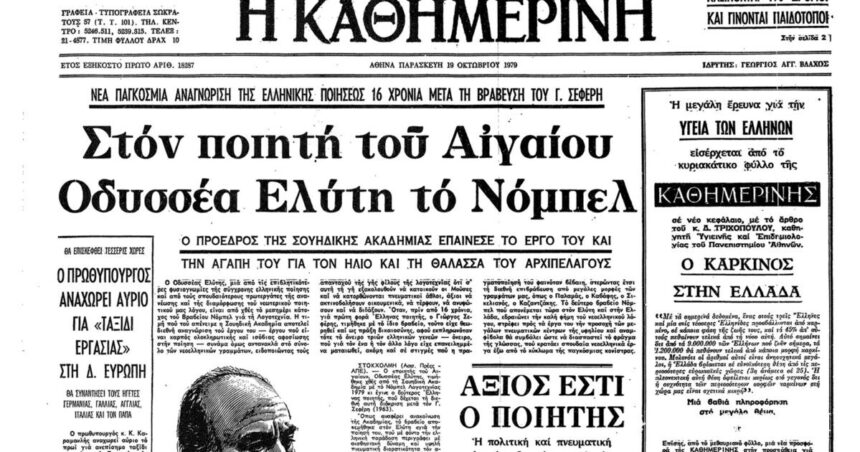In 1979, the Swedish Academy honored for the second time a Greek poet, Odysseus Elytis, by awarding him the Nobel Prize in Literature. The first was George Seferis, who received the award in 1963 “for his wonderful lyrical style, which is inspired by a deep feeling for the Greek cultural ideal”. Sixteen years later, another representative of the literary generation of the 1930s, Odysseus Elytis, received his own award.
The news of the awarding of the Nobel Prize for Literature to Elytis caused great excitement among the Greeks. Both the state and political leadership of the country as well as the Greek press congratulated the poet on being awarded the Nobel Prize. In its main article on October 19, one day after the announcement of the prize being awarded to Elytis, Kathimerini wrote the following:
“Odysseus Elytis, one of the most imposing figures of modern Greek poetry and one of the most important pioneers of the renewal and shaping of our modern poetic language, has been the holder of the Nobel Prize for Literature since yesterday afternoon. The honor awarded to him by the Swedish Academy is an international recognition of his work – a work that is the fruit of a total and lifelong devotion to poetry – but at the same time it reflects on the whole of modern Greek letters, notifying the friends of literature all over the world that in this land there are still may the Muses dwell and spiritual deeds be accomplished, worthy to radiate universally, to indulge, to elevate and to teach. When, 16 years ago, for the first time a Greek poet, Giorgos Seferis, was honored with the same prize, this was also seen as an act of justice, since the dream of three Greek generations was then fulfilled – a dream, which for one reason or another it had repeatedly been thwarted, even at moments when its realization seemed certain, thus depriving the international reward of great figures of our letters such as Palamas, Cavafy, Sikelianos, Kazantzakis. The second Nobel prize now awarded to Elytis and to Greece, consolidates the good reputation of the modern Greek language, directs to his works the attention of the great intellectual centers of the world and will undoubtedly contribute to breaking down the language barrier, which keeps great modern Greeks projects outside the circuit of the world arena”.
The Nobel Prize in Literature for 1979 was awarded to Elytis by the Swedish Academy “for his poetry, which against the background of the Greek tradition describes with sensual power and high spiritual insight the modern man’s struggle for freedom and creation”. In its announcement, the Swedish Academy said that “the sea and the islands, their animals and plants, the soft pebbles and shores, the foam of the waves, the black sea urchins… are elements that recur constantly in his work. sensuality and light emanate from the poetry of Elytis. The sensory world is vividly alive in his work, rich in freshness and amazing experiences.”
Continuing, he emphasized that “the work of Elytis, although not political in the narrow sense of the term, is a ‘writing of preparedness’, which aims to defend moral integrity and is inspired by the perception of the uniqueness of man, which gives him strength for to face the trials of existence”.
However, the interest of the Swedish Academy was also aroused by his nickname Elytis (his real surname was Alepudelis). As he said, his nickname “reflects a synthesis of ideas of Greek thought, such as the name of his country itself, Greece, of Hope, Freedom and Helen, the name of the woman who symbolizes beauty and charm.”
The awarding of the Nobel Prize took place a few months later, on December 10, 1979. A guest of the Swedish government was the director of “Kathimerini” Eleni Vlachou, who quoted her experience in the following day’s paper.
Column editor: Myrto Katsigera, Vassilis Minakakis, Antigone-Despina Poimenidou, Athanasios Syroplakis





